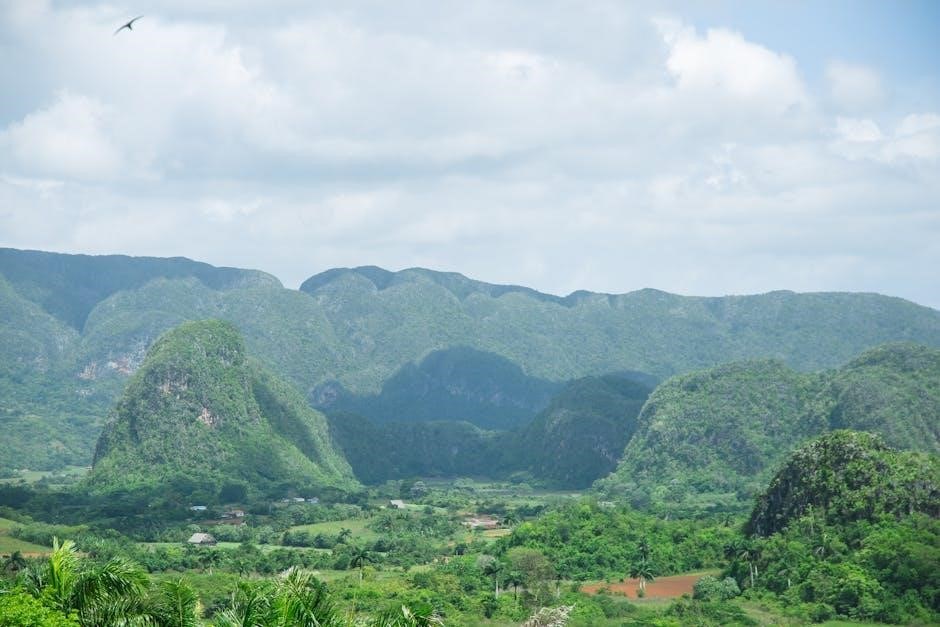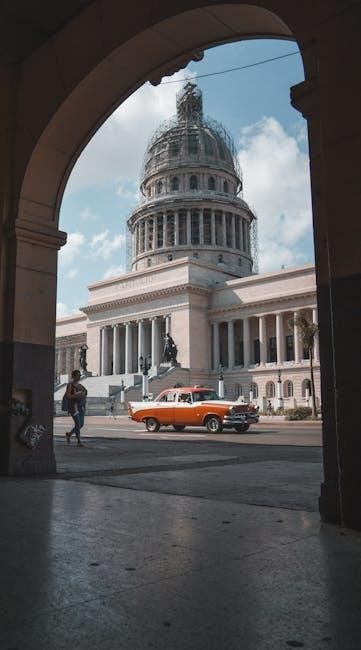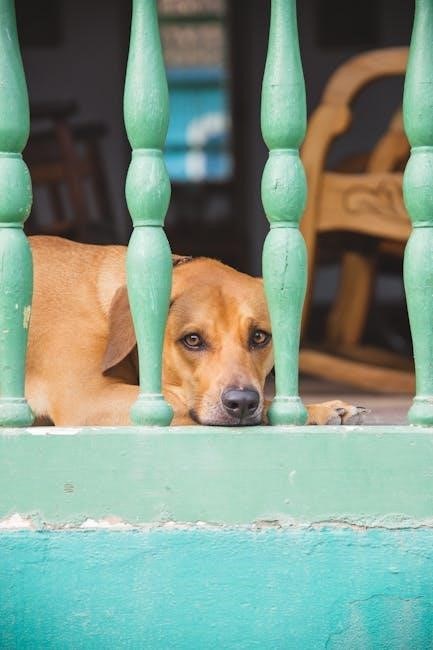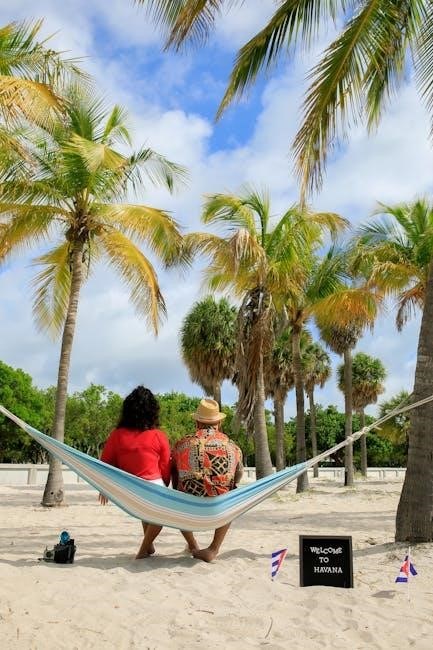
aduana de cuba cantidad de artículos permitidos pdf
Cuban Customs regulates imports to protect national interests, ensure compliance with laws, and facilitate legal trade. The regulations apply to all travelers, balancing ease of travel with necessary restrictions.
Overview of Cuban Customs Authority

The Cuban Customs Authority, known as Aduana de Cuba, is responsible for enforcing import and export regulations to protect national interests and public safety. Customs officials, identifiable by their uniforms with the ADUANA and CUBA logos, ensure compliance with laws aimed at preventing illegal activities such as drug trafficking and terrorism. The authority regulates the flow of goods, including personal items, gifts, and restricted products, to safeguard the environment and support local industries. Their role also includes inspecting luggage, collecting duties, and monitoring prohibited items. By balancing strict enforcement with efficient processing, the Cuban Customs Authority facilitates legal trade while maintaining national security and economic stability.
Purpose of Customs Regulations in Cuba
Cuban Customs regulations aim to protect the nation’s economic, environmental, and social interests. They ensure public safety by controlling the flow of goods, preventing illegal activities, and safeguarding against drug trafficking and terrorism. These rules also support local industries by limiting competition from imported goods, thereby fostering economic stability. Additionally, they help preserve Cuba’s cultural and ecological heritage by regulating sensitive items. The regulations are designed to balance the needs of travelers and businesses while maintaining national security and promoting lawful trade practices. By enforcing these measures, Cuba ensures a controlled and orderly environment for international exchange.

Permitted Items and Quantity Limits
Cuba allows travelers to bring personal goods, gifts, food, and medicine in specified quantities, ensuring compliance with import regulations to maintain legal trade and national security.

Personal Goods Allowed Through Customs
Travelers entering Cuba are permitted to bring personal items such as photographic equipment, binoculars, musical instruments, laptops, camping tents, and fishing rods. These items are generally exempt from customs duties, provided they are for personal use and not intended for commercial purposes. The Cuban Customs Authority allows individuals to carry these goods without restrictions, as long as they align with the country’s import regulations. Additionally, the limit for food, cleaning supplies, and medicine is up to 200 items or a maximum weight of 20 kg. This policy ensures that travelers can bring essential items while maintaining compliance with Cuban laws. Proper documentation may be required for certain items to avoid delays or penalties during the customs process. It is advisable to check the most recent regulations before traveling to Cuba to ensure smooth entry.
Gifts and Their Maximum Value
Travelers are permitted to bring gifts for family and friends in Cuba, with a maximum value of 1,287 Cuban Pesos (CUP). These items must be for personal use and not intended for resale. Gifts are exempt from customs duties, provided they adhere to the specified value limit. It is essential to declare gifts upon entry to avoid potential penalties. The Cuban Customs Authority allows individuals to bring items such as clothing, electronics, and personal care products as gifts, provided they fall within the permitted value. Proper documentation and transparency are key to ensuring smooth processing. Exceeding the value limit may result in additional taxes or confiscation of the items. Always verify the most recent regulations before traveling to Cuba to ensure compliance with customs requirements. This policy helps prevent commercial trafficking while allowing travelers to share gifts with loved ones.
Food, Cleaning Supplies, and Medicine Limits
Cuban Customs imposes specific limits on food, cleaning supplies, and medicine. Travelers are allowed to import up to 200 units or a maximum weight of 20 kilograms of these items. This applies to imports via air, sea, or mail. Medicines are permitted in quantities sufficient for personal use during the stay, with a maximum of 10 kilograms, and must be accompanied by a prescription if required. Food and cleaning supplies must be for personal consumption and not intended for resale. These restrictions aim to balance public health concerns with the needs of travelers. It is essential to declare all such items upon entry to avoid confiscation or penalties. Proper documentation and adherence to these limits ensure compliance with Cuban regulations. Travelers should verify the most recent guidelines before their trip to avoid any issues at customs. This policy helps maintain the integrity of Cuba’s public health and safety standards while accommodating individual needs.

Specific Restrictions and Prohibitions
Cuban Customs enforces strict regulations to control imports, protecting the economy and public safety. Certain goods, like tobacco and alcohol, have import limits, while others are outright prohibited. Compliance is mandatory.
Tobacco and Alcohol Import Limits
Travelers entering Cuba are permitted to bring limited quantities of tobacco and alcohol. Specifically, individuals may import up to 400 cigarettes, 50 cigars, or 500 grams of tobacco. For alcohol, the limit is set at 3 bottles of alcoholic beverages. These restrictions are enforced to regulate personal use and prevent commercial activity. Exceeding these limits may result in confiscation of the excess items or fines. It is important to note that these limits apply to all travelers, regardless of their purpose of visit. Additionally, Cuban Customs may scrutinize imports to ensure compliance with these regulations. Travelers should declare these items upon arrival to avoid complications. Understanding and adhering to these limits helps ensure a smooth customs process. Always check the most recent regulations before traveling to Cuba, as limits may be subject to change.
Prohibited and Restricted Items
Cuban Customs prohibits the importation of certain items to safeguard national security, public health, and cultural heritage. Prohibited items include drugs, firearms, explosives, and pornographic materials. Additionally, the import of counterfeit goods and items deemed subversive to public order is strictly banned. Restricted items, such as specific chemicals and endangered species products, require special permits. Cuban authorities also restrict the import of high-tech surveillance equipment and certain types of encrypted devices without proper authorization. Travelers should be cautious with items like religious materials or political literature, as these may face scrutiny. It is crucial to declare all items upon entry and ensure compliance with these regulations to avoid confiscation or penalties. Always verify the most current restrictions before traveling to Cuba, as they are subject to change based on national policies and international agreements. This ensures a lawful and uninterrupted entry process.
Special Considerations for Musical Instruments
Travelers entering Cuba with musical instruments must adhere to specific regulations. Up to three musical instruments per person are permitted for personal use or as gifts. These items must be declared upon entry to avoid confiscation or fines. Instruments intended as gifts must not exceed the gift value limit of 1,287 CUB. Professional musicians or those importing instruments for commercial purposes may require additional documentation, such as a commercial invoice or proof of ownership. The Cuban Customs Authority may inspect instruments to ensure compliance with import regulations. It is essential to carry documentation proving the instrument’s value and purpose to facilitate the customs process. Failure to comply with these requirements can result in delays or confiscation of the instruments. Always check the most recent customs guidelines before traveling to ensure smooth entry with musical instruments.

Customs Declaration Requirements
All items exceeding personal use limits must be declared upon entry to Cuba. This includes gifts, food, cleaning supplies, medicine, and specific quantities of tobacco and alcohol. Accurate declaration ensures compliance with regulations and avoids penalties.
What Must Be Declared Upon Entry
Travelers entering Cuba must declare all items exceeding personal use limits, including gifts, food, cleaning supplies, medicine, and specific quantities of tobacco and alcohol. Gifts valued up to 1,287 CUP must be declared, as well as food and supplies exceeding 20 kg or 200 units. Musical instruments, laptops, and other personal goods like binoculars and camping gear must also be declared. Medicines, including personal supplies, should be declared if exceeding 10 kg. Failure to declare items can result in penalties, fines, or confiscation. Accurate and complete declarations ensure compliance with Cuban customs regulations and avoid legal consequences. Proper documentation and receipts for gifts or high-value items are recommended to facilitate the process. Declaring all items upfront helps maintain the integrity of the customs process and ensures a smoother entry into Cuba.
Consequences of Non-Compliance
Failure to comply with Cuban customs regulations can result in severe penalties, including fines, confiscation of goods, or even legal action. Undeclared items exceeding permitted limits, such as tobacco, alcohol, or restricted goods, may be seized. Non-compliance with declaration requirements for gifts, personal goods, or medicines can lead to financial penalties. Repeat offenses may result in heightened scrutiny or bans on future travel. Proper documentation and adherence to customs rules are essential to avoid these consequences. Travelers must ensure all items, including gifts and personal effects, are declared accurately to prevent legal repercussions. Ignorance of regulations is not considered a valid defense, so understanding and complying with customs rules is crucial for a smooth entry into Cuba.

Additional Information and Resources

For detailed guidance, official Cuban customs documentation outlines permitted item quantities and import regulations. Visit Cuban government websites or consult local embassies for the most accurate and updated information.
Official Cuban Customs Documentation
The official Cuban customs documentation provides comprehensive details on import regulations, including quantity limits for permitted items. These documents are available on the Cuban government’s website and at embassies, ensuring travelers access accurate information. They outline specific restrictions, such as limits on tobacco, alcohol, and medicines, as well as guidelines for declaring personal goods and gifts. The documentation also covers prohibited items and special considerations for certain goods like musical instruments. By consulting these official resources, travelers can ensure compliance with Cuban customs laws, avoiding penalties and delays. Regular updates reflect changes in regulations, making it essential to check the latest versions before travel.
Where to Find Detailed Import Regulations
Detailed information on Cuban import regulations can be found on the official Cuban Customs website and through governmental publications. Travelers can access downloadable PDF guides, such as the “aduana de cuba cantidad de artículos permitidos,” which outline permissible item quantities and restrictions. Additionally, Cuban embassy and consulate offices worldwide provide updated regulatory documents. Upon arrival, customs offices at airports and ports also distribute informational brochures. These resources are available in both Spanish and English to cater to international travelers. Regularly checking these official sources ensures compliance with the latest customs rules, minimizing the risk of penalties or delays. By referencing these documents, travelers can plan their luggage and declarations accordingly, ensuring a smooth entry process into Cuba.